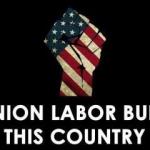Strong Unions Will Boost America's Economy
https://portside.org/2017-08-01/strong-unions-will-boost-americas-economy

Portside Date:
Author: Rana Foroohar
Date of source:
Financial Times

Labour unions in America get a bad rap. In Europe, they are viewed as an important part of the overall economic landscape, and a key reason wages have remained high in the face of global competition. Sadly, in the US, employers typically see unions as sclerotic enforcers of rigid and antiquated rules, entities to be squashed rather than worked with. Donald Trump certainly agrees. Getting rid of what’s left of the American labour movement has been a public goal of his, one that will probably be in the news again this autumn, as legislation and court cases that could defund public sector unions will be back on the front burner. Meanwhile, Democrats failed to even mention the word union in their new “Better Deal” economic plan announced last week.
Yet you could easily argue that a revitalised labour movement is exactly what the US needs right now. The labour share of the overall economic pie is at a post-second world war low, which is an enormous problem in an economy that is 70 per cent dependent on consumer spending. The demise of the traditional union movement (which represents only 10.7 per cent of the American workforce today, half of what it was in the early 1980s), is one of the biggest contributors to that problem. Labour simply has no bargaining power these days, an issue exacerbated by the gig economy and automation.
Yet there are signs that a new kind of labour movement may be brewing. Consider the recent growth of the Freelancers Union, which represents some 350,000 workers, mainly in major urban areas. Unlike traditional unions, where dues are collected by law and workers tend to be in public service industries or areas like building trades and manufacturing, the Freelancers Union caters to higher level service workers (writers, graphic artists, photographers). This underscores the changing nature of what it means to be “working class”. If you consider it merely in terms of a dollar per hour figure, many such white-collar freelancers would not count. But if you consider it in terms of job insecurity, as many leftwing economists increasingly do, then these workers absolutely have similar challenges and concerns, from a lack of pensions and healthcare to an increasing vulnerability to being undercut by job replacing technologies, which are moving higher up the economic food chain.
The economic and political potential of that mix appeals to Freelancers Union founder Sara Horowitz. “Ideologically, I come out of the Jewish labour movement of the 1920s, which included not only garment factory workers but also small entrepreneurs.” Indeed, she has brought an interesting mix of entrepreneurial zeal and strategic thinking to her community. The Freelancers Union was, for example, instrumental in getting a law passed in New York City which allows independent contractors to sue for double damages and legal fees when clients fail to pay.
The favourable view of unions has traction among young people on both sides of the political aisle
Ms Horowitz’s group subsequently developed an app to help members find lawyers who would take on their cases, and since most of those legal professionals were independent or working for small firms, she began organising them too (she plans to take this strategy into other areas like the accounting profession). “I get concerned when the labour movement is defined narrowly,” says Ms Horowitz, who wants Democrats to better link the concerns of a full range of workers of all incomes.
It could be an opportune moment to do so. A Pew Foundation study shows that millennials have different views about unions than their parents do. Positive feelings about unions have been growing since a low point around 2010 — 48 per cent of the population believes that unions are a good thing — but millennials have the most positive view. Kashana Cauley, a writer for the The Daily Show with Trevor Noah, recently wrote in the New York Times on the topic, calling for millennials to fight back at a time when “the government wants to disembowel public and private healthcare and when wages are on the decline”, by joining “existing unions or unionise ourselves”.
Interestingly, this view has traction among young people on both sides of the political aisle. Half of conservative millennials actually support unions, compared with only 24 per cent of older Republicans, in large part because of concerns about their upward mobility (Republicans with less education are more likely to view unions favourably).
This presents a major opportunity for Democrats. They need to make sure that their party is not captured by coastal libertarians — who are viewed even less favourably than heartland authoritarians by the majority of Americans — if they want to win in midterm elections in 2018, not to mention the 2020 presidential election.
It is no stretch to say that the power imbalances between the corporate sector and labour are just as extreme today as they were in the 1930s, when the last major American labour movement rose up. The difference this time is merely in who is being affected by that imbalance — software engineers, web designers, bus drivers and schoolteachers alike. Politicians who can craft an economic agenda that speaks to the increasingly shared concerns of all these groups will do well for themselves, and the economy as a whole. And they might even use the word union while they are at it.
